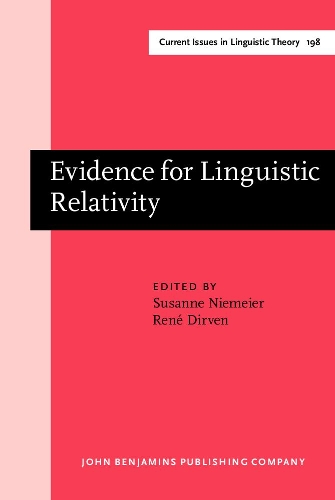
Evidence for Linguistic Relativity
Series: Current Issues in Linguistic Theory
This volume has arisen from the 26th International LAUD Symposium on “Humboldt and Whorf Revisited. Universal and Culture-Specific Conceptualizations in Grammar and Lexis”. While contrasting two or more languages, the papers in this volume either provide empirical evidence confirming hypotheses related to linguistic relativity, or deal with methodological issues of empirical research.These new app
NaN
VOLUME
English
Hardback

This volume has arisen from the 26th International LAUD Symposium on “Humboldt and Whorf Revisited. Universal and Culture-Specific Conceptualizations in Grammar and Lexis”. While contrasting two or more languages, the papers in this volume either provide empirical evidence confirming hypotheses related to linguistic relativity, or deal with methodological issues of empirical research.These new approaches to Whorf’s hypotheses do not focus on mere theorizing but provide more and more empirical evidence gathered over the last years. They prove in a very sophisticated way that Whorf’s ideas were very lucid ones, even if Whorf’s insights were framed in a terminology which lacked the flexibility of linguistic categories developed over the last quarter of this century, especially in cognitive linguistics. To date, there is sufficient proof to claim that linguistic relativity is indeed a vital issue, and the current volume confirms a more general trend for rehabilitating Whorf’s theory complex and also offers evidence for it. It contains articles written by scholars from various fields of linguistics including phonology, psycholinguistics, language acquisition, historical linguistics, anthropological linguistics and (cross-)cultural semantics, which all contribute to a re-evaluation and partial reformulation of Whorf’s thinking.Table of Contents: 1. Preface (by Niemeier, Susanne); 2. Introductory comments (by Lucy, John A.); 3. Part 1. Evidence from Language: Production, Interpretation, and Change; 4. Linguistic relativity in speech perception: An overview of the influence of language experience on the perception of speech sounds from infancy to adulthood (by Bohn, Ocke-Schwen); 5. Equivalence and mismatch of semantic features: Collocations in English, Spanish and Dutch (by Schroten, Jan); 6. Can grammar make you feel different? (by Maratsos, Michael); 7. Semantic change as linguistic interpretation of the world (by Gyori, Gabor); 8. (Micro-)categorization, semantic change, and the Sapir-Whorf hypothesis (by Rhodes, Richard A.); 9. Part 2. Evidence beyond Language: Cognition, Discourse, and Culture; 10. Verbalized events: A dynamic approach to linguistic relativity and determinism (by Slobin, Dan I.); 11. Universal ontological knowledge and a bias toward language-specific categories in the construal of individuation (by Imai, Mutsumi); 12. Grammar and social practice: On the role of 'culture' in linguistic relativity (by Bickel, Balthasar); 13. "S'engager" vs. "to show restraint": Linguistic and cultural relativity in discourse management (by Peeters, Bert); 14. Grammar and the cult of the virgin: A case study of Polish religious discourse (by Tabakowska, Elzbieta); 15. Subject Index; 16. Language Index
Price Comparison [India]
In This Series
Bestseller Manga
Trending NEWS




















